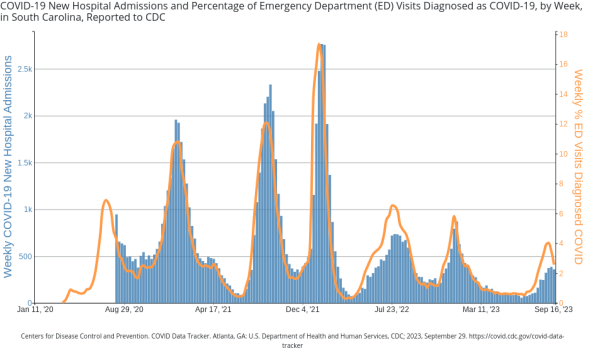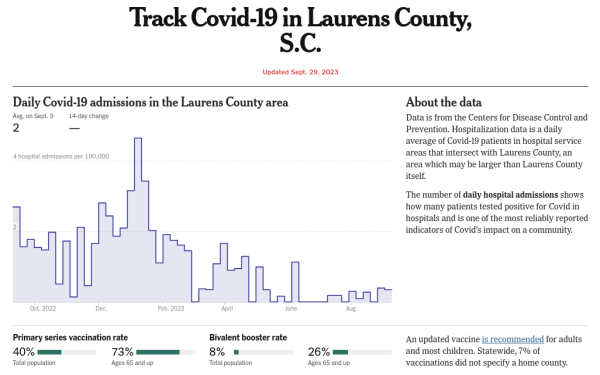As the fall season approaches, reminders about COVID-19 safety precautions and other signs of illness at Presbyterian College are an essential matter to look into.
The campus carefully follows the Centers for Disease Control and Prevention (CDC) guidelines to protect the community from illnesses such as the coronavirus. Even though the statistics of test positivity and hospitalizations from the CDC reveal a moderate increase for this following month in South Carolina, it is beneficial to remember the safety protocols for COVID-19. In addition to that, if there are any concerns about health difficulties, the Student Health Services of Presbyterian College are available on PC’s main website. Laurens County provides several health facilities off campus as well. Visit the Health & Social Services website for Laurens County for more information about the health facilities.
A recent viewpoint article from Jama Network, COVID-19 in the Fall of 2023—Forgotten but Not Gone, explained how the virus in the United States may potentially increase in number if there are no precautions taken.
Furthermore, the significant role of the COVID-19 vaccine was referred to in the article. Dr. Carlos del Rio, from Emory University School of Medicine, remarked, “Vaccination is safe and effective and protects against the most serious effects of SARS-CoV-2 infection, specifically hospitalization and death. However, protection against symptomatic infection is limited, and waning immunity is a reality with the currently available vaccines.” The CDC has also announced an update about the recent release of the COVID-19 vaccine. For general inquiries about the recent COVID-19 vaccine release, visit here. In addition to that, the vaccine for flu and COVID-19 are available at the campus. For further information about flu and COVID-19 immunization dates and location, click on this link: VaccineClinics2023.pdf (presby.edu)
“While Covid-19 is no longer a public threat, waves of infection will occur for the foreseeable future. How disruptive these are will depend on the behavior of the virus but also, more importantly, on the behavior of humans.” del Rio said. More importantly, getting sick is inevitable because the human body is not immune to infections. According to the Family Care Centers Medical Group, predictable illnesses such as the common cold, flu, allergies, norovirus, acute ear infections, acute bronchitis, and arthritis are a few of the frequent illnesses most Americans catch during the autumn season. Numerous people, such as elders, workers, and students, were affected by the pandemic. This occurrence challenged many individuals in countless ways because of its unexpected appearance. Implementing proactive choices will allow our community to remain mask free, and the best way to avoid the spread of viruses is by taking safety precautions first. Last but not least, don’t hesitate to reach out if you aren’t sure what to do!
(As a fellow gen z student, I have some advice for my fellow gen z peers: before pumpkin spice, it doesn’t hurt to wash your hands twice.)


References
Stay Up to Date with COVID-19 Vaccines | CDC
Coronavirus Disease 2019 (COVID-19) | CDC
CDC Recommends Updated COVID-19 Vaccine for Fall/Winter Virus Season | CDC Online Newsroom |








